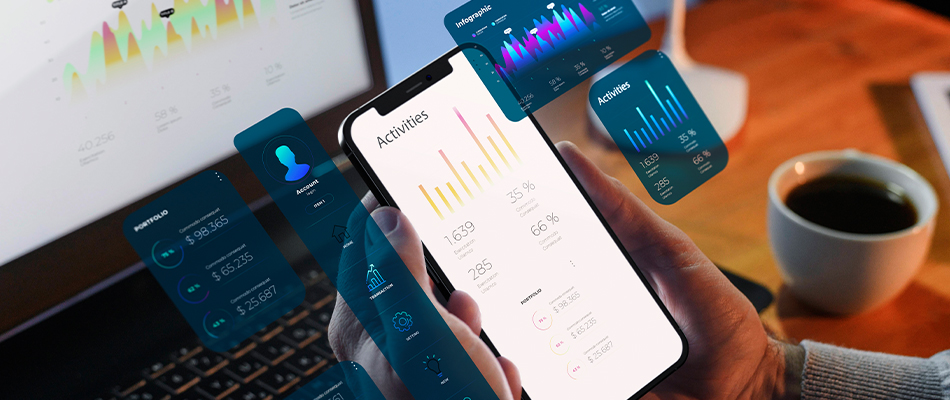Mobile marketing is revolutionising the way businesses engage with consumers. As mobile phones become the primary medium for online access in South Africa, companies are investing heavily in mobile-driven strategies. According to Statista, over 90% of internet users in the country access the web via smartphones. As a result, professionals skilled in mobile marketing are in high demand across industries. As mobile penetration grows across South Africa, this field presents exciting career opportunities. The Regenesys Postgraduate Diploma in Digital Marketing equips learners with mobile marketing expertise and digital leadership skills.
In this article, we will cover what is mobile marketing, its types, tools, strategies, advantages, and the career benefits of pursuing this field.
Table of Contents

What is Mobile Marketing?
When we research what is mobile marketing, we understand that it is a part of the broader digital marketing field. It focuses on connecting with consumers through mobile devices such as smartphones and tablets. As a subset of digital marketing, mobile marketing uses multi-channel tactics, including SMS campaigns, mobile-friendly websites, push notifications, QR codes, mobile apps, and social media advertising to engage users effectively.
Mobile marketing enables businesses to deliver personalised, location-based, and real-time interactions. It stands out for being data-driven, measurable, and highly efficient. With mobile usage far surpassing desktop access in South Africa, businesses are embracing mobile marketing to improve customer loyalty, boost conversions, and drive digital engagement.
The Regenesys Postgraduate Diploma in Digital Marketing equips learners with advanced skills in mobile marketing and broader digital strategies. Through practical modules, real-world tools, and expert instruction, students gain the knowledge to implement impactful mobile marketing campaigns across industries.
Read more on How to Build a Career in Digital Marketing here!

Types of Mobile Marketing
It is difficult to completely grasp what is mobile marketing without understanding various types of mobile marketing. As a strong segment of digital marketing, mobile marketing includes a wide range of approaches designed to reach customers through their mobile devices. Each type offers unique opportunities for engagement, depending on the business objectives and the habits of the target audience.
Understanding and applying the various types of mobile marketing allows marketers to customise campaigns that align with user behaviour and device preferences. The Regenesys Postgraduate Diploma in Digital Marketing offers practical exposure to these channels, helping students build competence in mobile-first campaign design.
For those trying to gain a better understanding of what is mobile marketing, below are the most common types of mobile marketing used by businesses to engage with customers:
- SMS Marketing: Involves sending promotional or transactional text messages directly to users’ mobile phones, often used for flash sales, alerts, or reminders.
- Push Notifications: Short alerts delivered through mobile apps, prompting users to take immediate action or re-engage with the app.
- Mobile App Marketing: Focuses on promoting products or services through advertisements within mobile applications.
- Location-Based Marketing: Uses GPS data to target users in specific geographic areas, allowing for personalised and timely offers.
- QR Code Marketing: Involves placing scannable QR codes in physical or digital spaces to lead users to mobile-optimised landing pages.
- Mobile Web Marketing: Ensures websites and digital ads are responsive and user-friendly on mobile browsers.
- In-game Mobile Advertising: Integrates branded messages or banners into mobile games to reach a highly engaged audience.
- Social Media Mobile Ads: Refers to mobile-optimised advertising campaigns on platforms like Facebook, Instagram, and TikTok.
Read more on Why Every Small Business Owner Should Study a Digital Marketing Course

Mobile Marketing Strategy
A well-planned mobile marketing strategy is central to successful digital campaigns. As a core part of digital marketing, a mobile marketing strategy outlines how businesses engage customers through mobile channels like SMS, apps, and mobile-optimised websites. Understanding what is mobile marketing helps professionals create targeted strategies that meet business goals and consumer expectations.
Developing a mobile marketing strategy starts with identifying the target audience, setting clear campaign objectives, and choosing the appropriate types of mobile marketing. It must focus on mobile responsiveness, seamless user experience (UX), and the integration of relevant mobile marketing tools to track and optimise performance.
When professionals enrol for the Postgraduate Diploma in Digital Marketing at Regenesys Business School, they gain practical experience in developing a data-driven mobile marketing strategy through practical modules, industry case studies, and simulations. This prepares them to lead marketing efforts in a mobile-first digital economy.
Listed below are some high-impact mobile marketing strategies employed by businesses:
- Audience segmentation and creation of detailed personas
- Mobile-optimised content and landing pages tailored to device behaviour
- Integration of SMS marketing, app engagement, and social media mobile ads
- Use of location-based targeting and personalisation technologies
- Ongoing A/B testing and analysis of campaign metrics
Understand How to Become a Marketing Manager? Essential Skills and Qualifications here!
Mobile Marketing Tools
To execute a successful mobile marketing strategy, professionals rely on a range of mobile marketing tools. These tools streamline campaign planning, automate outreach, enable app engagement, and offer detailed analytics for optimisation. Whether you’re managing SMS campaigns or app-based interactions, the right tools are essential for driving results in digital marketing.
While researching what is mobile marketing, let us learn about popular mobile marketing tools and their functions, some of which are listed below:
- Google Firebase: Provides app analytics, user engagement tracking, and push notification services.
- Braze: Enables personalised customer messaging across mobile, email, SMS, and in-app channels.
- Airship: Supports mobile engagement through advanced push notification capabilities.
- Leanplum: Offers campaign management features, personalisation, and performance tracking.
- Hootsuite: Facilitates social media mobile marketing by scheduling, monitoring, and analysing mobile posts.
- Google Ads: Delivers mobile-optimised advertising for both mobile websites and mobile applications.
- Twilio: A powerful platform for sending SMS, managing voice calls, and integrating mobile messaging into campaigns.
Find out What Does A Marketing Manager Do? Understanding Their Responsibilities and Skills here!
Mobile Marketing Trends
Understanding current mobile marketing trends is crucial for anyone aiming to build a relevant and effective mobile marketing strategy. As part of the broader digital marketing landscape, these trends reflect rapid changes in technology, user preferences, and how brands interact with mobile users. Staying informed ensures that businesses maintain a competitive edge and meet evolving consumer expectations.
One of the best ways to learn about mobile marketing trends and how to strategise campaigns is through higher education, such as the PG Diploma in Digital Marketing by Regenesys Business School. This NQF Level 8 programme includes practical modules that help students understand what is mobile marketing and how to deliver results in real-world campaigns.
Listed below are some mobile marketing trends shaping the industry today:
- Voice Search Optimisation: As more users rely on voice assistants like Siri and Google Assistant, optimising content for mobile voice search is becoming essential in mobile marketing.
- AI and Chatbots: Automation tools now manage customer queries and engagement via apps and messaging platforms, improving response time and personalisation.
- Video-first Content: Platforms like TikTok and Instagram Reels are driving short-form video content, which has become central to modern mobile marketing strategies.
- 5G Powered Experiences: Faster data speeds support interactive mobile ads, augmented reality (AR), and smoother video playback on mobile devices.
- Hyper-personalisation: Advanced data analytics allow marketers to deliver tailored content in real time, a key feature of effective mobile marketing tools and platforms.
Why is Mobile Marketing Important?
Once you have understood what is mobile marketing, it is important to also understand its importance. Mobile marketing makes it possible for brands to engage consumers directly through their most-used device. With mobile usage now surpassing desktop browsing in South Africa, businesses must adopt mobile-first strategies to remain competitive and relevant.
For anyone wondering, why is mobile marketing important, listed below are a few reasons:
- Wider Reach: Allows businesses to target South Africa’s growing mobile-first population.
- Personalisation: Delivers targeted messages based on user location, behaviour, and preferences.
- Cost Efficiency: Achieves better ROI compared to traditional media channels.
- Faster Results: Drive real-time engagement, response, and conversions.
- Data-Driven Decisions: Track and optimise campaigns instantly with mobile analytics.
Advantages and Disadvantages of Mobile Marketing
Mobile marketing has become an indispensable tool in digital strategy. With the widespread use of smartphones and mobile internet, it enables brands to reach audiences instantly and more personally than ever before. However, like any marketing approach, it has its limitations.
When trying to understand what is mobile marketing, it is necessary to examine the advantages and disadvantages. This helps professionals craft campaigns that are effective, ethical, and sustainable.
The table below highlights the advantages and disadvantages of mobile marketing:
| Advantages | Disadvantages |
| Immediate and direct communication with users | Privacy concerns and strict data regulations |
| High open and response rates, particularly via SMS | Risk of message fatigue if overused |
| Personalised, location-based targeting | Requires ongoing monitoring and optimisation |
| Scalable for reaching large and diverse audiences | Device compatibility and technical limitations |
| Real-time tracking and performance measurement | Limited screen space for creative or detailed content |
Mobile Marketing vs Traditional Marketing
When evaluating mobile marketing vs traditional marketing, the contrast becomes evident across multiple dimensions, from cost-efficiency and targeting to flexibility and engagement. Modern businesses increasingly prefer mobile strategies due to their real-time capabilities and lower overheads.
Understanding what is mobile marketing and how it differs from traditional marketing allows marketers to make informed decisions based on budget, audience, and campaign goals. The Regenesys Digital Marketing Programme equips learners with the skills to leverage mobile platforms effectively while appreciating the strategic context of both marketing approaches.
The table below helps to distinguish between mobile marketing and traditional marketing, and can help aspiring marketers better understand what is mobile marketing:
| Aspect | Mobile Marketing | Traditional Marketing |
| Medium | Digital platforms such as SMS, mobile apps, and websites | Offline channels like print, television, radio, billboards |
| Cost | Generally lower due to digital formats and automation | Higher costs involving production, printing, and media space |
| Targeting | Personalised, real-time targeting based on user behaviour | Broad targeting with limited segmentation |
| Engagement | Interactive, measurable, and immediate | Passive with limited tracking and engagement metrics |
| Flexibility | Easily adaptable; campaigns can be tested and refined | Fixed once launched; difficult to adjust mid-campaign |
Know How Does Social Media Marketing Affect Small Businesses in the Digital Age? Here!
Conclusion
When we discuss what is mobile marketing, we see it as a data-driven approach to reaching consumers through their mobile devices. As South African users spend more time on their phones, the demand for professionals skilled in mobile marketing continues to rise. From strategy and tools to types and trends, mobile marketing opens new doors in digital business.
The Regenesys Postgraduate Diploma in Digital Marketing empowers students with the knowledge and practical skills needed to excel in this fast-paced field. Pick contact learning or a flexible study format and build a future-ready marketing career.
Start your mobile marketing journey with Regenesys. Visit the website today and learn how you can apply for this postgraduate qualification.
What is Mobile Marketing? – FAQs
What is mobile marketing and how does it work?
Mobile marketing is a strategy to promote products or services via smartphones and tablets. It includes SMS, apps, push notifications, and more.
Why is mobile marketing important in South Africa?
Mobile use dominates internet access in South Africa. It allows for real-time engagement, location-based targeting, and higher response rates.
What are some common types of mobile marketing?
Common types include SMS, mobile app ads, push notifications, QR codes, and in-game ads.
What is the difference between mobile marketing vs traditional marketing?
Mobile marketing is digital, measurable, and cost-effective. Traditional marketing uses print or broadcast and has limited targeting options.
Are there disadvantages of mobile marketing?
Yes, such as privacy issues, over-saturation, and technical limitations, are some limitations of mobile marketing. However, they can be managed with the right strategy.
What qualifications do I need to work in mobile marketing?
A digital marketing qualification, such as the Regenesys Postgraduate Diploma in Digital Marketing can help provide expertise to explore roles in this field.







